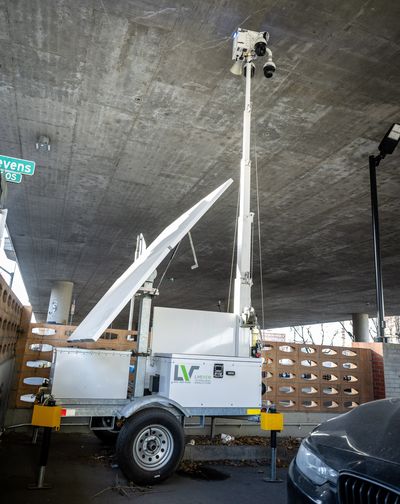Mobile surveillance system coming soon to Spokane

Spokane will be watching.
The Spokane City Council on Monday approved the one-year lease of a mobile camera and security system that will be placed in crime hot spots around the city.
Council President Breean Beggs and Councilwoman Betsy Wilkerson voted against the lease agreement.
The D3 Mobile Security Unit, produced by Utah-based LiveView Technologies, uses three 360-degree cameras with thermal and optic capabilities. The standalone units also are equipped with strobe and flood lights, a two-way speaker, cloud-based data storage and an attached solar panel to power it, among other features.
“The camera can’t be everywhere, all the time, so it’s not going to be a solution,” Councilman Zack Zappone said. “But it can help deter crime in certain areas where we’re seeing kind of some peaks.”
In particular, Zappone said he was motivated to champion the surveillance system in response to a rise in shootings. There were 166 shootings in Spokane last year, he said, compared with 151 in 2021, 94 in 2020 and 52 in 2018.
The one-year pilot program, sponsored by Zappone, will be used by the Spokane Police Department to gauge whether the system can help reduce shootings and other crime, as well as aid law enforcement in arresting perpetrators.
Though advocates on the Council said the device could help law enforcement more effectively deter and respond to crime, some worry that the camera will be expensive – nearly $30,000 for the year – and question its effectiveness.
Shortly before Monday’s vote, activist Justice Forall noted the City Council had not specified how the camera would be used, leaving that decision to police. Forall questioned whether police would not use the cameras to target activists.
In response, Councilman Jonathan Bingle noted the Council had the authority to set policies, including setting limits on how the cameras could be used.
In an interview, Wilkerson questioned why the Council was approving the camera lease without having simultaneously or previously set those restrictions on its use.
She also questioned whether it would be possible to gauge the impact on crime deterrence of a single camera that would be regularly moved.
“I would be open to buying more than one to get the information we need to make a better decision,” she said.
Beggs primarily questioned the cost-effectiveness of the camera system, which costs tens of thousands of dollars to lease for a single year.
“For that amount of money, it seems like we should be able to get a lot more coverage in town,” said Beggs, who added that the unit looked “police state-ish.”
“Obviously, cameras bring issues of security and privacy,” Zappone said in response. “But when it comes to issues like this … I think it’s more important to make people feel safe in our community.”
Similar camera systems are in place elsewhere in the city, including in the parking lots of private businesses.
Councilwoman Karen Stratton noted she prefers to park near those well-lit cameras at night, saying that they made late-night grocery trips feel safer.
Wilkerson questioned whether it was the camera or better lighting that made the biggest impact on Stratton’s feeling of safety. Councilman Michael Cathcart added that he had unsuccessfully advocated for more funding for lighting in neighborhoods but would support any tool that could improve public safety.
Spokane Public Schools purchased a unit from LiveView last summer for surveillance of the Lewis and Clark High School parking lot, where student and staff vehicles were frequently broken into, said Randy Moore, director of campus safety.
That LC camera has proven successful enough that the district is considering placing another one at the other end of the three-block parking lot, Moore added.
“It’s been a huge deterrent,” he said. “I would say it cut down crime by 60%, or even higher than that.”
Spokane Valley recently purchased a similar unit and placed it in a handful of locations for around two months, said Mark Gregory, spokesman for the Spokane County Sheriff’s Office. While it’s too soon to have hard data on the effectiveness of the unit, it has been popular with the businesses near where it has been placed, he added.
It is too early to say exactly where Spokane’s new camera will be placed, Spokane Police Department spokeswoman Julie Humphreys said. That decision will likely be made by precinct leadership, which meets regularly for strategy meetings to discuss crime trends and strategies, she added.
It’s also too early to say how success will be measured going forward, Humphreys added.
“We’ll have to come up with parameters for success as we go,” she added.